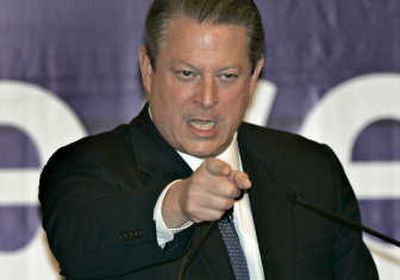Gore tells U.N. conference to work around Bush

NUSA DUA, Indonesia – An international impasse deepened here Thursday over U.S. refusal to accept specific targets in a “road map” toward reaching a worldwide climate agreement by 2009, as European leaders threatened to boycott the parallel process that President Bush launched with great fanfare a month and a half ago.
Throughout a week of negotiations on the island of Bali, Bush administration officials have steadily resisted a United Nations proposal calling on industrialized countries to accept a goal of reducing their greenhouse gas emissions by 25 to 40 percent by 2020. In retaliation, several European officials said they may not attend the next installment of the White House-sponsored “major economies meeting” on global warming, which is set to resume next month in Honolulu.
In an interview Thursday, German Environment Minister Sigmar Gabriel said it would not make sense for Bush to continue those talks unless negotiators make significant progress here in defining the range of emissions cuts they need to consider.
“If we will not find a solution here in Bali, I cannot see what we should negotiate in the major economies meetings,” Gabriel said. “If you want to organize a road map, you should know where is the destination.”
In a sign of how badly relations have deteriorated between the United States and other nations over the climate issue, delegates to the U.N.-sponsored talks in Bali burst into applause Thursday night when former Vice President Al Gore blamed the Bush administration for jeopardizing the negotiations and alluded to the end of Bush’s term in office in just over a year.
In a 48-minute speech, Gore urged delegates here to “go far, quickly” in reducing greenhouse gas emissions linked to global warming, saying they should forge ahead with a consensus statement and leave “a large open space in your document” to allow a future U.S. president to work more aggressively to curb global warming.
“My country’s been responsible for obstructing the process here in Bali, we know that,” he said to an overflow crowd, many of them forced to sit on the floor. “Over the next two years the United States is going to be somewhere where it is not now. You must anticipate that.”
Gore added that he understood how some delegates might be tempted to abandon the process altogether, but he cautioned that if the talks collapse, “the entire world could lose momentum and could lose progress.”
Instead, Gore suggested that they “negotiate around this enormous obstacle, this elephant in the room.”
It was not immediately clear whether the speech by Gore, who on Monday collected a share of the Nobel Peace Prize in Oslo for his activism on global warming, would have an impact on the talks, which are deadlocked over the question of how much industrialized and developing nations must each do to reduce global warming pollution.
Administration officials, for their part, said at a news conference that they remain committed to producing a document that would allow both industrialized and developing nations to explore a range of options aimed at curbing dangerous climate change.
“There’s a strong determination to reach that outcome here,” said Paula Dobriansky, the U.S. undersecretary of state for democracy and global affairs, who heads the administration’s delegation in Bali. “We still have some work to do, today and tomorrow.”